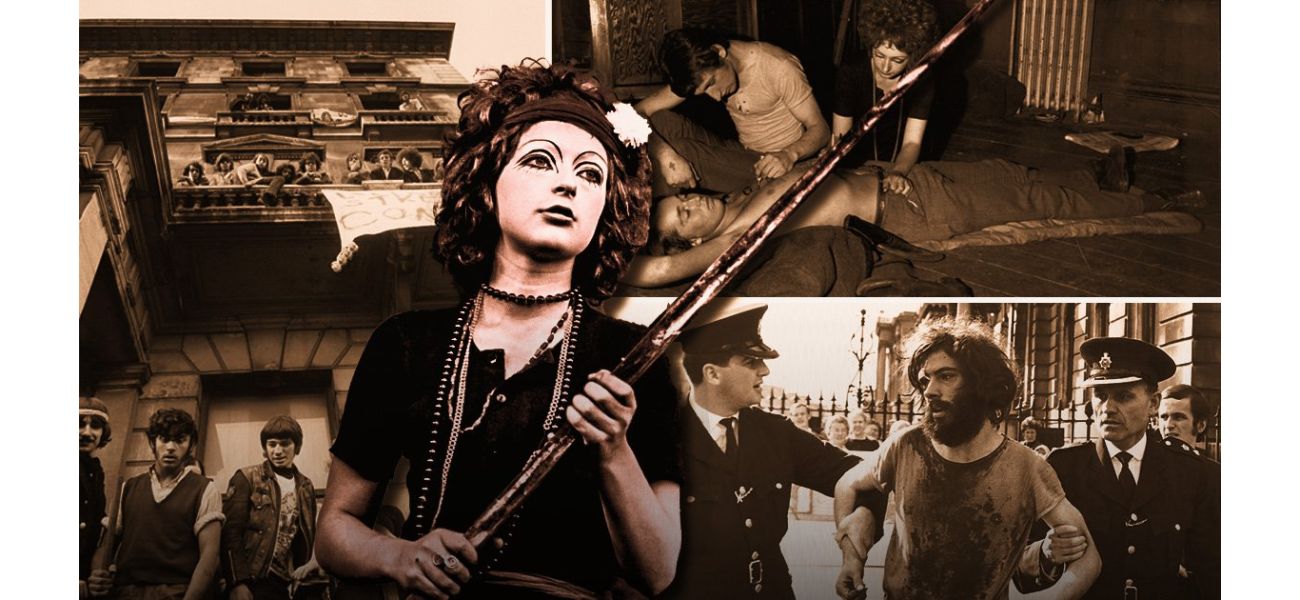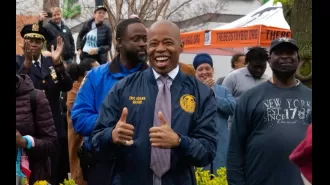Hippies occupied a costly Piccadilly mansion.
Police quickly demolished the squatters' community.
September 29th 2024.

In the summer of 1969, just like in the popular song by Bryan Adams, 17-year-old Richie Garnder believed that the warm season would never end. He was a part of the hippy culture, a group of people who believed in living a peaceful life and were often portrayed as eccentric by the media. Richie, who is now 72 years old, actually prefers to be called a "freak", a term that was not too far off from what they were called by the public when he and hundreds of others found a temporary home at the abandoned mansion, 144 Piccadilly, in London.
This sprawling mansion, with 100 rooms, became the unofficial residence for many in 1969. The group of squatters, who were looking for a place to call home, were eventually forced out by the police after a six-day occupation. Piccadilly Circus, a well-known area in the West End, was home to several empty buildings at the time. This was a common occurrence in post-war London, as many homes were damaged and left abandoned. The squatters, who were often referred to as "misfits", "freaks", and "unsheltered people", were left with few options but to illegally occupy these buildings.
Richie and his fellow squatters, who were among the founding members of the London Street Commune, spent their summer squatting at various locations in central London. They held planning meetings and dealt with the increasing number of runaways who sought refuge with them. Despite the challenges, life at 144 Piccadilly was busy but fulfilling. They received daily supplies from a film company and gave interviews to several newspapers, although they refused to speak to certain tabloids.
The London Street Commune was formed in 1967 by a group of 20 individuals who were inspired by the post-war squatters' movement. Their goal was to empower themselves against police harassment and media accusations. The group consisted of a diverse mix of individuals, including hippies, revolutionaries, anarchists, runaways, and sex workers. They believed that homelessness, especially in a wealthy area like Piccadilly, was unacceptable. And the huge abandoned mansion at 144 Piccadilly represented this issue perfectly.
The occupation of 144 Piccadilly was not without its challenges, but the squatters made the best of their time there. They set up beds and hung out in the ballrooms, turning it into their own version of "Hippydilly". They even had some unlikely members, such as the Hell's Angels motorcycle club, who joined them in their cause. Chris Faiers, a 76-year-old poet who was also a part of the commune, recalls how they fought alongside the Angels during their stay at 144.
John Bernard, who was an 18-year-old messenger boy at the time, remembers warning the commune about a journalist who was trying to sneak into the building. The group often took shifts to gather food from nearby restaurants and grocers. This was a way for them to sustain their living at the mansion. Despite their efforts, they were eventually forced to leave the building by the police.
The occupation of 144 Piccadilly was a protest to draw attention to the increasing rates of homelessness in London. It may have only lasted for a week, but it became a symbol of the struggles faced by those without a home. Today, Richie lives in the Welsh Black Mountains, while the former leader of the commune, Dr. John Moffatt, has since passed away. But the memories of their time at 144 Piccadilly live on, reminding us of the ongoing battle against homelessness in our society.
In the summer of 1969, a group of young individuals found themselves drawn to the abandoned mansion at 144 Piccadilly in central London. Among them was Richie Garnder, a 17-year-old hippie, who had been living in squats with his fellow members of the London Street Commune. They were a group of like-minded individuals who believed in peace, love, and living off the grid.
For Richie, this was the summer of freedom. He thought it would never end, just like the famous Bryan Adams song. After months of squatting in different buildings, he had found a sense of community at 144 Piccadilly. The mansion, with its 100 rooms, became the unofficial home for hundreds of people. They lived off daily supplies delivered by a film company and held planning meetings over breakfast. Richie, being a busker and musician, also made a living by performing on the streets.
But this idyllic summer came to an abrupt end when the police raided the mansion on September 21st, just three minutes after the occupation had begun. The commune had become a target for the tabloids, and they refused to speak to certain newspapers. Despite this, they were constantly bombarded with interviews and media attention.
Squatting was not a new concept in post-war London. With many homes damaged and homelessness rates on the rise, it was one of the few options for those in need of shelter. The London Street Commune, inspired by the squatters' movement, started squatting in the well-heeled district of Piccadilly Circus in 1967. They had formed the commune to empower themselves against police harassment and tabloid accusations.
The commune was a diverse group of individuals, including hippies, misfits, revolutionaries, and anarchists. They believed that homelessness was not acceptable, especially in a place like Piccadilly. And the empty mansion at 144 Piccadilly was a symbol of this issue.
After the commune broke into the mansion, they barricaded the doors and even built a bridge over the dry moat to enter the building. They made themselves at home, decorating the ballrooms and smoking weed in the servant's quarters. The mansion, now lovingly called "Hippydilly," was filled with people from all walks of life, including the notorious Hell's Angels motorcycle club.
Chris Faiers, a poet who had also been part of the commune, recalls how even the Hell's Angels had joined in on the squat. But despite the diverse group of individuals, they were united in their belief that the mansion should not stand empty while people were left homeless on the streets.
John Bernard, a young messenger boy at the time, remembers a journalist trying to sneak into the mansion disguised as a hippy. He quickly warned his friend, who was staying at the mansion, and the journalist was promptly kicked out.
Ultimately, the occupation was a protest against the rising rates of homelessness in London. And although it only lasted for six days, it brought attention to this pressing issue and sparked a conversation about the rights of those without a home. For Richie, now living in the Welsh Black Mountains, this experience will always be a defining moment in his life.
This sprawling mansion, with 100 rooms, became the unofficial residence for many in 1969. The group of squatters, who were looking for a place to call home, were eventually forced out by the police after a six-day occupation. Piccadilly Circus, a well-known area in the West End, was home to several empty buildings at the time. This was a common occurrence in post-war London, as many homes were damaged and left abandoned. The squatters, who were often referred to as "misfits", "freaks", and "unsheltered people", were left with few options but to illegally occupy these buildings.
Richie and his fellow squatters, who were among the founding members of the London Street Commune, spent their summer squatting at various locations in central London. They held planning meetings and dealt with the increasing number of runaways who sought refuge with them. Despite the challenges, life at 144 Piccadilly was busy but fulfilling. They received daily supplies from a film company and gave interviews to several newspapers, although they refused to speak to certain tabloids.
The London Street Commune was formed in 1967 by a group of 20 individuals who were inspired by the post-war squatters' movement. Their goal was to empower themselves against police harassment and media accusations. The group consisted of a diverse mix of individuals, including hippies, revolutionaries, anarchists, runaways, and sex workers. They believed that homelessness, especially in a wealthy area like Piccadilly, was unacceptable. And the huge abandoned mansion at 144 Piccadilly represented this issue perfectly.
The occupation of 144 Piccadilly was not without its challenges, but the squatters made the best of their time there. They set up beds and hung out in the ballrooms, turning it into their own version of "Hippydilly". They even had some unlikely members, such as the Hell's Angels motorcycle club, who joined them in their cause. Chris Faiers, a 76-year-old poet who was also a part of the commune, recalls how they fought alongside the Angels during their stay at 144.
John Bernard, who was an 18-year-old messenger boy at the time, remembers warning the commune about a journalist who was trying to sneak into the building. The group often took shifts to gather food from nearby restaurants and grocers. This was a way for them to sustain their living at the mansion. Despite their efforts, they were eventually forced to leave the building by the police.
The occupation of 144 Piccadilly was a protest to draw attention to the increasing rates of homelessness in London. It may have only lasted for a week, but it became a symbol of the struggles faced by those without a home. Today, Richie lives in the Welsh Black Mountains, while the former leader of the commune, Dr. John Moffatt, has since passed away. But the memories of their time at 144 Piccadilly live on, reminding us of the ongoing battle against homelessness in our society.
In the summer of 1969, a group of young individuals found themselves drawn to the abandoned mansion at 144 Piccadilly in central London. Among them was Richie Garnder, a 17-year-old hippie, who had been living in squats with his fellow members of the London Street Commune. They were a group of like-minded individuals who believed in peace, love, and living off the grid.
For Richie, this was the summer of freedom. He thought it would never end, just like the famous Bryan Adams song. After months of squatting in different buildings, he had found a sense of community at 144 Piccadilly. The mansion, with its 100 rooms, became the unofficial home for hundreds of people. They lived off daily supplies delivered by a film company and held planning meetings over breakfast. Richie, being a busker and musician, also made a living by performing on the streets.
But this idyllic summer came to an abrupt end when the police raided the mansion on September 21st, just three minutes after the occupation had begun. The commune had become a target for the tabloids, and they refused to speak to certain newspapers. Despite this, they were constantly bombarded with interviews and media attention.
Squatting was not a new concept in post-war London. With many homes damaged and homelessness rates on the rise, it was one of the few options for those in need of shelter. The London Street Commune, inspired by the squatters' movement, started squatting in the well-heeled district of Piccadilly Circus in 1967. They had formed the commune to empower themselves against police harassment and tabloid accusations.
The commune was a diverse group of individuals, including hippies, misfits, revolutionaries, and anarchists. They believed that homelessness was not acceptable, especially in a place like Piccadilly. And the empty mansion at 144 Piccadilly was a symbol of this issue.
After the commune broke into the mansion, they barricaded the doors and even built a bridge over the dry moat to enter the building. They made themselves at home, decorating the ballrooms and smoking weed in the servant's quarters. The mansion, now lovingly called "Hippydilly," was filled with people from all walks of life, including the notorious Hell's Angels motorcycle club.
Chris Faiers, a poet who had also been part of the commune, recalls how even the Hell's Angels had joined in on the squat. But despite the diverse group of individuals, they were united in their belief that the mansion should not stand empty while people were left homeless on the streets.
John Bernard, a young messenger boy at the time, remembers a journalist trying to sneak into the mansion disguised as a hippy. He quickly warned his friend, who was staying at the mansion, and the journalist was promptly kicked out.
Ultimately, the occupation was a protest against the rising rates of homelessness in London. And although it only lasted for six days, it brought attention to this pressing issue and sparked a conversation about the rights of those without a home. For Richie, now living in the Welsh Black Mountains, this experience will always be a defining moment in his life.
[This article has been trending online recently and has been generated with AI. Your feed is customized.]
[Generative AI is experimental.]
0
0
Submit Comment





